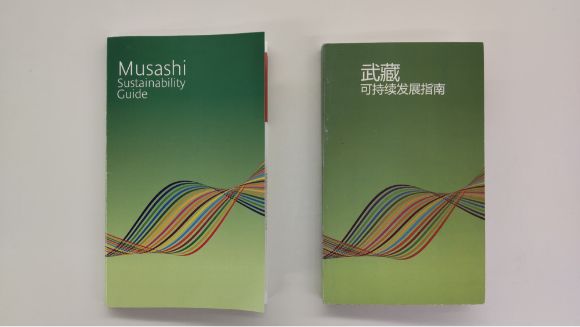CSR Initiatives
CSR initiatives
Sustainable value creation
CSR Policy
CSR Policy
Musashi Paint Group (hereinafter referred to as "We") was established in 1958 as Musashi Paint, a manufacturer and seller of lacquer paints. Since then, with the support of customers and stakeholders, we have grown into a global company with production sites in 9 countries as a holding company.
To realize our management philosophy of " The Musashi Paint Group will develop and supply original products in an effort to contribute to society and generate benefits for customers, raw material suppliers, shareholders, and employees, as well as nurture each and every one of the employees from both an intellectual and physical perspective so that they can work together with pride.", we will continue to work together with stakeholders for the development of a sustainable society.
We will engage in CSR activities to deepen the trust of stakeholders and increase our corporate value by continuing to meet the demands of society.
CSR activities
As shown in the diagram below, there are two types of CSR activities at our group: those that have a positive impact on society (Offensive CSR), and those that do not have a negative impact on society (Defensive CSR).
Activities that have a positive impact on society (Offensive CSR) resolve societal issues and hope that our co-creation of values with society will be recognized, which will enhance our corporate values. The basis of this mindset is “Creating Shared Value (CSV)” proposed by Professor Michael Porter of the Harvard Business School.
Society demands that companies leverage their capabilities (unique technologies, products, and social activities) to resolve societal issues. SDGs are the embodiment of these societal issues. There are 17 goals and 169 targets indicated as SDGs. Our company leverages our unique features to engage in activities that have a positive impact on society (Offensive CSR) based on 3 pillars.
We regard activities that do not have a negative impact on society (Defensive CSR) as behaviors to not “cause trouble” to society or the Earth. This is the ideal state of a company. There are guidelines on how to achieve this state, issued by public institutions and other organizations. It should also be noted that activities that have a negative impact affects our group companies and the entire supply chain. Recently, some companies have been assessing their business partners' CSR activities through surveys and other means. We considered the guidelines set by public institutions, other organizations, and the notes made in the CSR survey to determine the seven activities that do not have a negative impact on society (Defensive CSR).


The table above shows which stakeholders are affected by our group’s CSR activities.
Our CSR initiatives affect all of our group’s stakeholders and engage different organizations.
CSR enlightenment training
In late June 2023, our group issued the “Musashi Sustainability Guide” which summarized our CSR activities.
This handbook consists of 3 parts- (1) positioning of CSR, (2) activities that have a positive impact on society (Offensive CSR), and (3) activities that do not have a negative impact on society (Defensive CSR). There are 3 sections in part 2 and 7 sections in part 3, each describing the activities in more detail.

This handbook triggered the CSR Promotion Office to start CSR enlightenment training based on the Musashi Sustainability Guide. In 2023, they conducted training at 6 manufacturing sites across 5 countries, including Japan. In the first half of 2024, they plan to complete the first round of enlightenment training at all manufacturing sites.
I think employees used to perceive CSR activities as social contribution activities. But the establishment of the CSR Promotion Office in January 2023, the issuance of CSR initiative documents, and employee briefing sessions made everyone aware that there are also activities that do not have a negative impact on society (Defensive CSR). At our group, we see that there are two sides to CSR activities and will continue to value and promote both sides.

